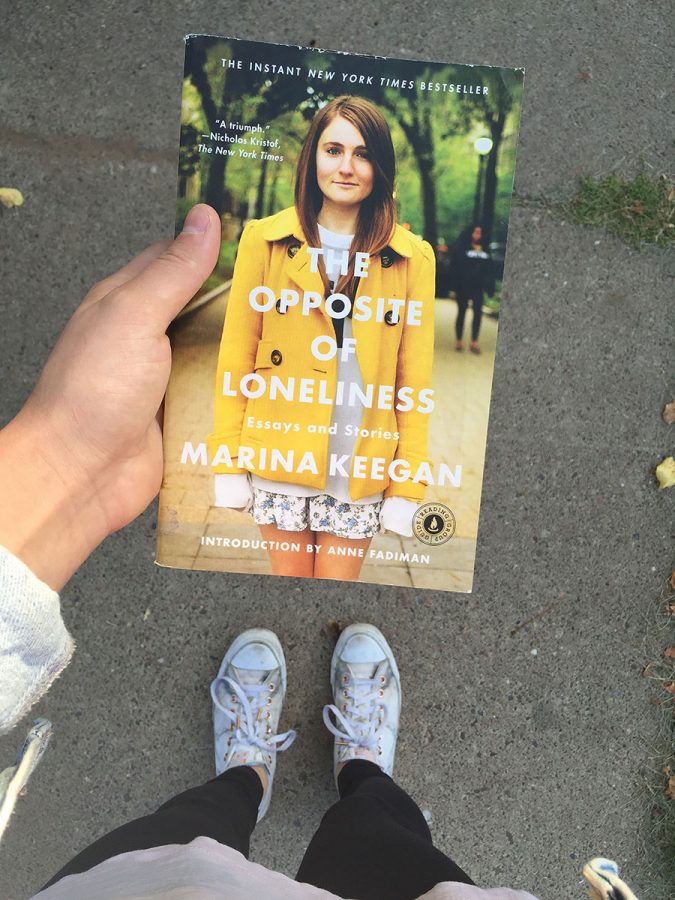Happiness as a destination: the road to self-comparison
The real reason so many young adults find themselves amidst a quarter-life crisis
Photo by Hailey Novak
Novak stands on the sidewalk with Marina Keegan’s book, “The Opposite of Loneliness” in hand. The book made her realize that happiness is more than a checklist.
October 4, 2016
Each day as I venture toward my apparently impending quarter-life crisis I begin to question whether this twenty-something struggle occurs because it’s inevitable or because we’ve let someone else’s ideas of happiness and success become an unavoidable roadblock in the way of our journey.
Somehow people like me (precarious twenty-somethings) have cultivated this idea within ourselves that we’re not doing or being enough. We created the notion that we need to be happy or for some reason we’re not doing it right.
It’s as if we’ve started viewing happiness as a destination we’ll eventually arrive at if we keep ticking things off our checklist, rather than a constantly fluctuating emotion continuing along with us in and out of different stages of our lives.
Because of this fabricated “need to please” we berate ourselves when we fail and make mistakes. It feels like the absolute end of the world because we’ve sewn ourselves together so delicately that the stitches are only slightly strengthened by success and easily ripped apart by failure.
I’m wondering when we decided that failure couldn’t be a part of this journey.
We let our ideas of how things should be get in the way of how things actually are. Because of this, when something doesn’t go as planned it feels like a loss that we didn’t live up to our own expectations.
Then we settle. For a false sense of happiness, or an average life because we want to at least make it look like things are okay. Like we’re doing alright.
Marina Keegan, a Yale graduate and young author who passed away in a tragic car accident a week after her graduation at the age of 22 touched on this idea in an essay written as part of her commencement speech that year.
“We’re so young. We’re so young. We’re twenty-two years old. We have so much time. There’s this sentiment I sometimes sense, creeping in our collective conscious as we lay alone after a party, or pack up our books when we give in and go out – that it is somehow too late. That others are somehow ahead. More accomplished, more specialized. More on the path to somehow saving the world, somehow creating or inventing or improving. That it’s too late now to begin a beginning and we must settle for continuance, for commencement.”
Keegan wrote this nearly four years ago and I’m sure she had no idea what kind of impact her words would have on lives like mine, like many of ours.
She won’t be the last to comment on this behavior young adults have adopted either.
An author for Relevant Magazine sheds light from another perspective, ultimately expressing the same idea. “Obsessive Comparison Disorder is our compulsion to constantly compare ourselves with others,” they said, “producing unwanted thoughts and feelings that drive us to depression, consumption, anxiety and all-around joyous discontent.”
We’ve set the bar so high for ourselves that we assume everyone else is watching us, making sure we scale it. Or even worse, we look around us and continue to raise it based on the success of others, needing to make sure we’re just as far in the race of life, keeping pace with everyone else.
What would happiness feel like if we weren’t immersed in self-comparison, if we didn’t deny ourselves a helping hand because we’re too consumed with the need to come out ahead.
We wouldn’t be so shaken and lost at the tender age of twenty-something if we started accepting our reality and realizing that we can always change it, not matter the number of missteps along the way.
College life has manifested this idea into us. We compare ourselves to others by nature in terms of grade point averages, credits accumulated and number of internships added to our resumes. We see others’ lives portrayed in photos on their Instagram pages and achievements on their timelines and we use that as fuel for our own measurement of success.
In response to Keegan’s words, I say screw the checklist and the comparison.
Five years from now I hope to be living authentically no matter the circumstances. I hope happiness will follow suit regardless of where I stand in relation to the peers with whom I once accepted my diploma. After all, we owe it to ourselves.

